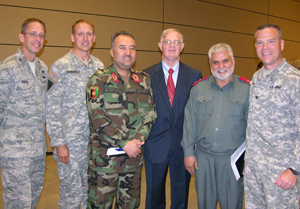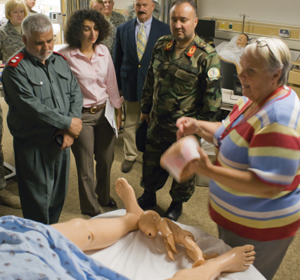 |
From left to right: Nebraska National Guard Col. Daryl Bohac and Col. Scott Gronewold, Afghanistan National Army Surgeon General Maj. Gen. Ahmad Zia Yaftali, Ward Chambers, M.D. of UNMC, Afghanistan National Police Surgeon General Brig. Gen. Qandahar Shinwari and Nebraska National Guard Col. Judd Lyons during a recent visit to UNMC. |
They made new friends and found hope through an affiliation agreement.
During visits to UNMC arranged by the Nebraska National Guard, an agreement was formed with surgeon generals of the Afghan National Army and Afghan National Police to help rebuild Afghanistan’s health education infrastructure, most of which has been ravaged after 30 years of war.
“The end objective is to create a very effective and accountable government for the Afghan people,” said Col. Scott Gronewold, domestic operations officer for the National Guard. “This really has national and global implications. What we do in Afghanistan enriches the people of Nebraska because we also learn just as much from them as they learn from us.”
|
Dr. Chambers leads agreement effort
Ward Chambers, M.D., coordinator of UNMC’s International Health and Medical Education, spearheaded efforts to forge an agreement between UNMC and the Afghan Armed Forces Academy of Medical Sciences (AFAMS).
UNMC will evaluate the AFAMS medical and graduate medical education programs and help plan improvements in:
- Medical, nursing and allied health education;
- Clinical rotations;
- Residency programs; and
- Research.
UNMC also will establish a visiting professor program.
A chance to aid a nation
The partnership is an opportunity for the state of Nebraska to be involved in health education that will impact the entire country, Dr. Chambers said.
“We can help them build a sustaining medical system where they can educate their own health care providers and therefore improve the quality of lives and save more lives,” Dr. Chambers said. “I think it’s something the state can be quite proud of. We eagerly look forward to working with the Afghan people.”
Funding will come from the U.S. government, military and civilian sources, Dr. Chambers said.
Efforts aimed at education and training
Efforts will be focused in the Afghanistan National Army Hospital and the Kabul Medical University. Plans call for periodic rotations of faculty on one to two-week visits to develop educational capabilities. The train-the-trainer concept will be used so Afghan physicians can train those in other cities and rural areas.
Maj. Gen. Ahmad Zia Yaftali, surgeon general of the Afghan National Army, said though there is some modern equipment in hospitals, there’s a shortage of Afghans qualified to operate or maintain the equipment.
“We will focus on education and training,” he said. “Disease is everywhere in Afghanistan. The concern also is for wounds afflicted in combat.”
“Whatever UNMC and the Guard assist us with will benefit not only the military and police, but the whole country,” said Brig. Gen. Qandahar Shinwari. “The last 30 years of war has destroyed everything in our country including our medical facilities. I thank the Nebraska National Guard and UNMC leaders for their interest in Afghanistan.”
No licensing standards for physicians exist
Currently there are no national standards or licensing of physicians in Afghanistan. A medical school diploma provides a license to practice, Dr. Chambers said. In medical school, students take three years of basic science courses at Kabul Medical University hospital, then perform three years of clinical training.
Medical residencies have begun recently — the first such programs in Afghanistan in about 30 years, he said. Prior to that, medical school graduates trained in an apprentice system under a physician for one or two years. The goal is to establish a residency program like that of the United States.
“That’s what they’ve asked us to do,” Dr. Chambers said.
 |
Patti Carstens, far right, demonstrates one of the human patient simulators in the Sorrell Center clinical skills lab. Front row, from left, are Afghanistan National Police Surgeon General Brig. Gen. Qandahar Shinwari, Himan Nawas of the National Guard Bureau, and Afghanistan National Army Surgeon General Maj. Gen. Ahmad Zia Yaftali. (Andrew E. Nelson/UNMC public relations) |
UNMC faculty, staff and students have travelled on and off to Afghanistan since the 1970s through a collaboration with Tom Gouttierre, director of the Center for Afghanistan Studies at the University of Nebraska at Omaha.
Dr. Chambers, who has travelled to Afghanistan on humanitarian medical missions since 2002, credited Goutierre for bringing UNMC and the Guard together on this project and said he is enthusiastic about the positive interest he has received from UNMC faculty who want to help.
The affiliation also will impact Afghanistan’s rural health care, Dr. Chambers said.
Afghan officials see hope in UNMC model
The Afghan generals were impressed with UNMC’s rural health education model, which could help Afghanistan develop its rural health efforts.
“There has been a lot of progress in seven years and I think they are poised in Afghanistan to do a whole lot better in the next three to five years,” Dr. Chambers said. “It will take a decade or two to fix this, but we have to start.”
Despite what most Americans see on the news about war-torn Afghanistan, Dr. Chambers said it’s a beautiful country.
“It’s the prettiest place I’ve ever been and I’ve traveled a lot,” he said. “The people of Afghanistan are the most wonderful people you’ve ever met. They’d do anything for you. They’re very hospitable and appreciative of what we’re doing. We have an opportunity to make an impact on the country.”